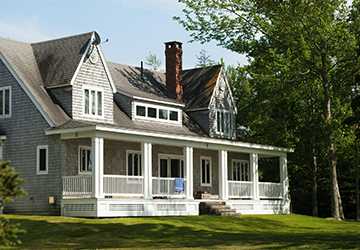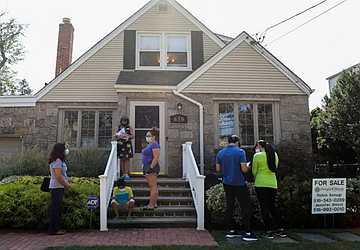The First-Time Home Buyer’s Checklist
Purchasing your first home is an exciting milestone! Make the process smooth and thriving by following this comprehensive checklist.

Save for Expenses
Buying a home has many upfront expenses that first-time buyers often need to pay more attention to. Be sure to prepare your finances for:
● Down payment - Have at least 20% of the purchase price saved for your down payment. This helps you avoid expensive PMI insurance. Go higher than 20% if possible.
● Closing costs - Estimate 2-5% of the total purchase price to cover closing fees and prepaid for taxes and insurance. Get a precise estimate from your lender.
● Moving expenses - Budget for movers or rental trucks, packing supplies, possible storage fees for belongings that won't fit right away, and replacing some old furnishings with new items better suited to your new home.
● Initial repairs and upgrades - Many buyers take on DIY painting, flooring upgrades, or minor renovations soon after moving in. Factor these into your budget.
● Emergency fund - Be sure you still have a healthy emergency fund available even after the down payment and closing costs come from savings. Owning a home comes with surprise expenses like a water heater replacement.
Shop multiple lenders to get pre-approved and understand exactly what price range you can afford based on your debt, income, and available down payment funds.
Define Your Needs
Determining your family's needs and wants will prevent you from making compromised choices in the heat of the home search. Consider:
● Location - Where you work, amenities, conveniences, commute times, proximity to schools or daycares if needed. Make sure it allows an easy commute.
● Size – Consider both lot size and interior square footage. Get enough bedrooms and bathrooms to prevent feeling cramped.
● Key features – Must-haves like an office, garage, fenced yard, laundry room, etc. Versus nice-to-haves that you could compromise on if needed.
● Type of home – Do you want new or resale? Condo, high-rise, single-family? Define your preferred style.
Take time to prioritize your absolute must-haves versus nice-to-have features so you don't overspend or choose the wrong property because it has granite counters but no yard.
Select a Real Estate Agent
A skilled buyer's agent is your advocate in negotiations, pricing assessment, and oversight of the transaction details. Pick an agent who:
● Knows the neighborhoods where you're looking very well from years of experience selling homes there. Local expertise is invaluable.
● Has strong relationships with listing agents in the area to facilitate smoother negotiations and warmer receptions to your offers.
● Will educate you thoroughly on the local market's process, values, and nuances. Look for patience with first-timers.
● Has excellent communication skills and will answer all your questions promptly and thoughtfully.
● Gets consistently favorable client sales prices thanks to skilled negotiating and marketing. Ask for sales price data to percentage of the list price.
Vet a few agents before choosing who to entrust with what will likely be your most significant investment to date.
Search Listings
Once pre-approved, start browsing available homes in your target price range:
● Check real estate websites like Zillow and Realtor.com for homes meeting your criteria
● Sign up for automated listing alerts from your agent to receive new matches right away
● Attend open houses in communities of interest
● Research new construction communities and speak with builder reps
Evaluate at least 10-15 homes in person before deciding. Resist feeling pressured to choose the first decent option.

Make an Offer
Your agent will advise you on an offer price after carefully assessing comparables and market factors. Submit a competitive offer by:
● Offering list price or slightly below depending on market demand
● Opting for favorable terms like a quick closing date or flexible move-in dates
● Writing a thoughtful, personal letter to build rapport with the seller
● Providing proof of your down payment funds and loan pre-approval letters to show you are serious and able to close quickly
Be prepared to negotiate, potentially enhance your offer, or even lose out on your first few attempts before getting an acceptance.
Conduct Inspections
Once your offer is accepted, thoroughly inspect the property before closing:
● Hire a professional home inspector to examine all major systems, structures, and potential issues. Review their report in depth.
● Get sewer line and chimney inspections separately since those aren't always included in a standard inspection.
● Have contractors evaluate any concerning areas or planned renovations to understand costs.
● Negotiate credits or required fixes from the sellers based on inspection findings. Don't skip this step.
Inspections protect you from buying issues hidden behind fresh paint or unseen from a tour.
Secure Financing
Finalizing your mortgage loan is the next big step:
● Shop mortgage rates and loan estimates from multiple lenders. Compare all costs - rate, origination fees, points, etc.
● Formally apply with your chosen lender and provide the requested documents ASAP to keep the process moving swiftly.
● Get the property appraised. Share appraisal info with your lender if it impacts your loan.
● Have your earnest money deposit ready to show the sellers your seriousness about closing.
Work closely with your lender to get fully approved and avoid last-minute snags.
Review Documents
Before closing, comb through all critical documents with a fine tooth comb:
● Purchase agreement - Understand all terms, contingencies, included fixtures
● Mortgage estimate - Guarantees your loan terms and closing costs
● Appraisal - Impacts mortgage amount and down payment funds needed
● Disclosures - Outline property conditions that may impact your decision to buy
● Insurance quote - Shop home insurance rates ahead of closing
Leave no detail overlooked that could come back to bite you later!
Complete Final Walkthrough
Do a final walkthrough within 24 hours of closing:
● Tour the property again, making sure all is for move-in. Does it still show as well as when you decided to buy?
● Look for any damages, repairs needed, or changes since your last visit.
● Confirm appliances, fixtures, and other inclusions are still on site as agreed.
● Review what conveys - window treatments, tools in garage, landscaping, etc.
Close and Move In
You're in the home stretch! A few final steps:
● Coordinate utility transfers - power, water, internet, cable.
● Arrange your moving truck or moving company. Recruit friends to help!
● Complete the final walkthrough and sign stacks of closing documents.
● Get your keys and officially take ownership!
The preparation will pay off as you make this significant milestone smooth and start enjoying your new home.
Conclusion
Buying your first home is achievable if you prepare financially, understand the process thoroughly, and work with an experienced real estate agent you trust. Stay organized and informed using this comprehensive checklist as your guide through each milestone. With the proper support and readiness, you can turn the dream of homeownership into a reality!





